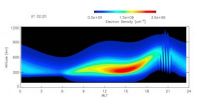Are sharks color blind?
New study shows that sharks have only 1 type of cone cell in their eyes, suggesting they are color blind
2011-01-19
(Press-News.org) Sharks are unable to distinguish colors, even though their close relatives rays and chimaeras have some color vision, according to new research by Dr. Nathan Scott Hart and colleagues from the University of Western Australia and the University of Queensland in Australia. Their study shows that although the eyes of sharks function over a wide range of light levels, they only have a single long-wavelength-sensitive cone* type in the retina and therefore are potentially totally color blind. Hart and team's findings are published online in Springer's journal Naturwissenschaften – The Science of Nature.
"This new research on how sharks see may help to prevent attacks on humans and assist in the development of fishing gear that may reduce shark bycatch in long-line fisheries. Our study shows that contrast against the background, rather than colour per se, may be more important for object detection by sharks. This may help us to design long-line fishing lures that are less attractive to sharks as well as to design swimming attire and surf craft that have a lower visual contrast to sharks and, therefore, are less 'attractive' to them," said Prof. Hart.
Sharks are efficient predators and their evolutionary success is thought to be due in part to an impressive range of sensory systems, including vision. To date, it is unclear whether sharks have color vision, despite well-developed eyes and a large sensory brain area dedicated to the processing of visual information. In an attempt to demonstrate whether or not sharks have color vision, Hart and colleagues used a different technique - microspectrophotometry - to identify cone visual pigments in shark retinas and measure their spectral absorbance.
They looked at the retinas of 17 shark species caught in a variety of waters in both Queensland and Western Australia. Rod cells were the most common type of photoreceptor in all species. In ten of the 17 species, no cone cells were observed. However, cones were found in the retinae of 7 species of shark from three different families and in each case only a single type of long-wavelength-sensitive cone photoreceptor was present. Hart and team's results provide strong evidence that sharks possess only a single cone type, suggesting that sharks may be cone monochromats, and therefore potentially totally color blind.
The authors conclude: "While cone monochromacy on land is rare, it may be a common strategy in the marine environment. Many aquatic mammals − whales, dolphins and seals − also possess only a single, green-sensitive cone type. It appears that both sharks and marine mammals may have arrived at the same visual design by convergent evolution, in other words, they acquired the same biological trait in unrelated lineages."
INFORMATION:
*There are two main types of photoreceptor cells in the retina of the eye. Rod cells are very sensitive to light and allow night vision. Cone cells also react to light but are less sensitive to it. Eyes with different spectral types of cone cells can distinguish different colors. Rod cells cannot tell colors apart.
Reference
Hart NS et al (2011). Microspectrophotometric evidence for cone monochromacy in sharks. Naturwissenschaften – The Science of Nature; DOI 10.1007/s00114-010-0758-8
The full-text article is available to journalists on request.
END
ELSE PRESS RELEASES FROM THIS DATE:
2011-01-19
Philadelphia, PA, 18 January 2011 - Biological Psychiatry is proud to announce this week's publication of a special issue focusing on postmortem studies of psychosis.
This special issue showcases the use of human brains postmortem to study psychiatric disorders, focusing on schizophrenia. The review articles highlight the benefits, achievements, problems, and perhaps most importantly, the future of postmortem research.
Postmortem research, which allows scientists to study the brain directly via its tissue, is difficult and expensive. Hence, it is a relatively rare avenue ...
2011-01-19
Developing new drugs is a highly costly and time-consuming process. Of 20 candidates, 19 are normally rejected because they don't work or have unwanted side effects. Now a research team led by Professor Lars Baltzer at Uppsala University has produced a tiny molecular "binder" that has the potential to change this landscape radically.
The study, published today in the prestigious journal Angewandte Chemie, presents the concept of a tiny polypeptide consisting of 42 amino acids to which virtually any target-seeking organic molecule can be bound. In the body it then seeks ...
2011-01-19
WASHINGTON -- The first global simulation study of equatorial spread F (ESF) bubble evolution using a comprehensive 3D ionosphere model, SAMI3, has been demonstrated. The model self-consistently solves for the neutral wind driven dynamo electric field and the gravity driven electric field associated with plasma bubbles.
Developed by Dr. Joseph Huba and Dr. Glenn Joyce at the NRL Plasma Physics Division, SAMI3 is a fully three-dimensional model of the low- to mid-latitude ionosphere. SAMI3 has been modified recently to use a sun-fixed coordinate system to eliminate rotation ...
2011-01-19
Nutrients, vitamins, minerals – during pregnancy a woman's body needs more of them. For most nutrients this increase in demand can be covered with a balanced diet. However, mothers-to-be should ingest some nutrients in the form of tablets. Research conducted by the Chair of Nutritional Medicine at the Technische Universitaet Muenchen (TUM) indicates there are knowledge gaps: According to this study, pregnant women often start taking sensible dietary supplements too late or not at all. At the same time, other micronutrients are unwittingly overdosed whose effects during ...
2011-01-19
Researchers at the University of Warwick have developed the world's first complete High Dynamic Range (HDR) video system, from video capture to image display, that will help a range of users including: surveillance camera operators, surgeons using video to conduct or record surgery, and camera crews following a football being kicked from sunshine into shadow.
The researchers will be premiering footage of the world's first ever showing of a short film shot using this new HDR technology in the WMG Digital Laboratory at the University of Warwick on Wednesday January 19 ...
2011-01-19
Controlling blood pressure is not only a medical challenge, but a social one as well. Because patients are required to strictly adhere to a treatment plan that may include medication, dietary restrictions and regular doctor visits, the ideas of wellness and health are also powerful parts of the social reinforcement needed for behavioral change.
This is especially true in the African American population, which is particularly susceptible to hypertension. Social and cultural barriers have been found to contribute to African American patients being far more likely than white ...
2011-01-19
New research by a team of psychologists from Canada, Belgium, and the United States shows there is more than a literal truth to the saying that 'you never get a second chance to make a first impression'. The findings suggest that new experiences that contradict a first impression become 'bound' to the context in which they were made. As a result, the new experiences influence people's reactions only in that particular context, whereas first impressions still dominate in other contexts.
"Imagine you have a new colleague at work and your impression of that person is not ...
2011-01-19
Boston, Mass. — Following a successful Phase 1 study for safety, researchers at MassBiologics of the University of Massachusetts Medical School (UMMS) today announced the beginning of a Phase 2 clinical trial testing the ability of a human monoclonal antibody they developed to prevent hepatitis C virus (HCV) infection of a donor liver in transplant patients.
The first patients were enrolled in the study in December. The primary goal of this randomized, double-blind, placebo-controlled study is to test if the monoclonal antibody, designated MBL-HCV1, prevents re-infection ...
2011-01-19
Montreal, January 18, 2011 – Does experience give seniors an edge in reacting to sudden change or are younger people quicker to respond? A new study from Concordia University shows that when a routine task is interrupted by an unexpected event, younger adults are faster at responding. Published in the Journal of Gerontology, the findings have implications for educators and for older adults in situations where performance is crucial.
"When we frequently perform a task, our reactions become automatic," says Kevin Trewartha, first author and a PhD student in Concordia's ...
2011-01-19
Key components of the ESA-led Mercury mapper BepiColombo have been tested in a specially upgraded European space simulator. ESA's Large Space Simulator is now the most powerful in the world and the only facility capable of reproducing Mercury's hellish environment for a full-scale spacecraft.
The Mercury Magnetospheric Orbiter (MMO) has survived a simulated voyage to the innermost planet. The octagonal spacecraft, which is Japan's contribution to BepiColombo, and its ESA sunshield withstood temperatures higher than 350°C.
This is a taste of things to come for the ...
LAST 30 PRESS RELEASES:
[Press-News.org] Are sharks color blind?
New study shows that sharks have only 1 type of cone cell in their eyes, suggesting they are color blind

